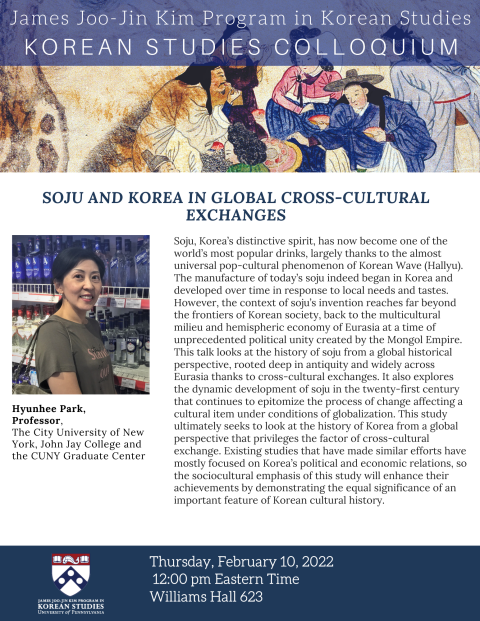
Korean Studies Colloquium
Williams Hall 623
Soju, Korea’s distinctive spirit, has now become one of the world’s most popular drinks, largely thanks to the almost universal pop-cultural phenomenon of Korean Wave (Hallyu). The manufacture of today’s soju indeed began in Korea and developed over time in response to local needs and tastes. However, the context of soju’s invention reaches far beyond the frontiers of Korean society, back to the multicultural milieu and hemispheric economy of Eurasia at a time of unprecedented political unity created by the Mongol Empire. This talk looks at the history of soju from a global historical perspective, rooted deep in antiquity and widely across Eurasia thanks to cross-cultural exchanges. It also explores the dynamic development of soju in the twenty-first century that continues to epitomize the process of change affecting a cultural item under conditions of globalization. This study ultimately seeks to look at the history of Korea from a global perspective that privileges the factor of cross-cultural exchange. Existing studies that have made similar efforts have mostly focused on Korea’s political and economic relations, so the sociocultural emphasis of this study will enhance their achievements by demonstrating the equal significance of an important feature of Korean cultural history.
Hyunhee Park (Ph.D. Yale University) is Professor of History at the City University of New York, John Jay College of Criminal Justice and the CUNY Graduate Center. She specializes in the history of cross-cultural contacts in East Asia and the Islamic World, in Sino-Islamic contacts in particular, in the Mongol Empire, and global history, focusing on information/knowledge transfers, including transfers of geographical knowledge, foodways, and distillation technologies. She authored Mapping the Chinese and Islamic Worlds: Cross-Cultural Exchange in Pre-Modern Asia (2012), Soju: A Global History (2021), and 30 articles for academic journals and edited volumes.
 James Joo-Jin Kim Center for Korean Studies
James Joo-Jin Kim Center for Korean Studies